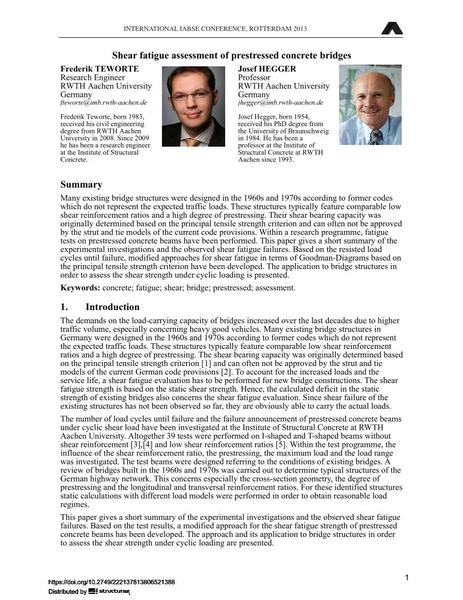Shear fatigue assessment of prestressed concrete bridges

|
|
|||||||||||
Bibliografische Angaben
| Autor(en): |
Frederik Teworte
Josef Hegger |
||||
|---|---|---|---|---|---|
| Medium: | Tagungsbeitrag | ||||
| Sprache(n): | Englisch | ||||
| Tagung: | IABSE Conference: Assessment, Upgrading and Refurbishment of Infrastructures, Rotterdam, The Netherlands, 6-8 May 2013 | ||||
| Veröffentlicht in: | IABSE Conference, Rotterdam, May 2013 | ||||
|
|||||
| Seite(n): | 530-531 | ||||
| Anzahl der Seiten (im PDF): | 8 | ||||
| Jahr: | 2013 | ||||
| DOI: | 10.2749/222137813806521388 | ||||
| Abstrakt: |
Many existing bridge structures were designed in the 1960s and 1970s according to former codes which do not represent the expected traffic loads. These structures typically feature comparable low shear reinforcement ratios and a high degree of prestressing. Their shear bearing capacity was originally determined based on the principal tensile strength criterion and can often not be approved by the strut and tie models of the current code provisions. Within a research programme, fatigue tests on prestressed concrete beams have been performed. This paper gives a short summary of the experimental investigations and the observed shear fatigue failures. Based on the resisted load cycles until failure, modified approaches for shear fatigue in terms of Goodman-Diagrams based on the principal tensile strength criterion have been developed. The application to bridge structures in order to assess the shear strength under cyclic loading is presented. |
||||
| Stichwörter: |
Beton Brücke Ermüdung Schub Bewertung
|
||||
